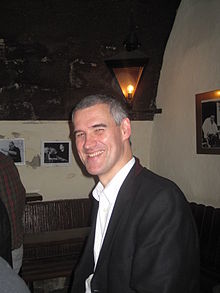Wolfgang Köhler
Appearance
(Redirected from Wolfgang Kohler)

Wolfgang Köhler (21 January 1887 – 11 June 1967) was a German psychologist and phenomenologist who, like Max Wertheimer, and Kurt Koffka, contributed to the creation of Gestalt psychology.
Quotes
[edit]The Mentality of Apes, 1925
[edit]Wolfgang Köhler, The Mentality of Apes, 1925; London: Pelican Books, 1957.
- (17.2. 1914) Beyond some bars, out of arm's reach, lies an objective [a banana]; on this side, in the background of the experiment room, is placed a sawn-off castor-oil bush, whose branches can be easily broken off. It is impossible to squeeze the tree through the railings, on account of its awkward shape; besides, only one of the bigger apes could drag it as far as the bars. Sultan is let in, does not immediately see the objective, and, looking about him indifferently, sucks one of the branches of the tree. But, his attention having been drawn to the objective, he approaches the bars, glances outside, the next moment turns round, goes straight to the tree, seizes a thin slender branch, breaks it off with a sharp jerk, runs back to the bars, and attains the objective. From the turning round upon the tree up to the grasping of the fruit with the broken-off branch, is one single quick chain of action, without the least 'hiatus', and without the slightest movement that does not, objectively considered, fit into the solution described.
- p. 94; As cited in: Arthur Koestler, The Act of Creation, 1964, p. 103
- For adult man with his mechanized methods of solution, proof is sometimes needed, as here, that an action was a real achievement, not something self-evident; that the breaking off a branch from a whole tree, for instance, is an achievement over and above the simple use of a stick, is shown at once by animals les
- p. 94; As cited in: Arthur Koestler, The Act of Creation, 1964, p. 103
- It is hardly an exaggeration to say that a chimpanzee kept in solitude is not a real chimpanzee at all.
- p. 293.
Gestalt Psychology. 1930
[edit]Wolfgang Köhler. Gestalt Psychology. London: G. Bell, 1930.
- Physics is becoming the study of organization. In this way ... it will converge with biology and psychology.
- p. 30
- If we wish to imitate the physical sciences, we must not imitate them in their contemporary, most developed form; we must imitate them in their historical youth, when their state of development was comparable to our own at the present time. Otherwise we should behave like boys who try to copy the imposing manners of full-grown men without understanding their raison d’être, also without seeing that in development one cannot jump over intermediate and preliminary phases.
- p. 32
- I do not deny that objective experience is imbued with acquired meaning in many respects... Probably no experience escapes from the influence of meaning.
- p. 61
- [Thinking] respond to an objective constellation of millions of stimuli by developing, first of all, an organised field, many and perhaps the most essential properties of which have no physical partner among the single stimuli.
- p. 137
- How ‘real’ it is one feels when trying to form other groups…Most people will never get this other grouping as clear, stable, and optically real as the former one.
- p. 143; About group formation
- At a given time some concrete forms are simply there in vision, not less than colors and brightnesses.
- p. 150
Dynamics in Psychology, 1940
[edit]Wolfgang Köhler. Dynamics in Psychology. New York: Liveright, 1940., 1973.
- Our present knowledge of human perception leaves no doubt as to the general form of any theory which is to do justice to such knowledge: a theory of perception must be a field theory. By this we mean that the neural functions and processes with which the perceptual facts are associated in each case are located in a continuous medium.
- p. 55
- At the present time it is of course quite customary for physicists to trespass on chemical ground, for mathematicians to do excellent work in physics, and for physicists to develop new mathematical procedures... Trespassing is one of the most successful techniques in science.
- p. 116
- For the most part similarities of various degrees will occur in one perceptual situation; and then specific perceptual units will be formed not simply because their members resemble each other, but because their mutual resemblance is greater than is that of such members and any other parts of the situation.
- p. 135
Quotes about Wolfgang Köhler
[edit]- The whole physiological theory of Gestalt, and many of its psychological postulates, break down when we come to audition. This is not surprising since Kohler concentrated entirely on visual perception; and in the seven hundred-odd pages of Koffka's Principles of Gestalt Psychology exactly one page (p. 200) is devoted to 'other (than visual) senses'.
- Arthur Koestler, The Act of Creation, 1964, p. 517

